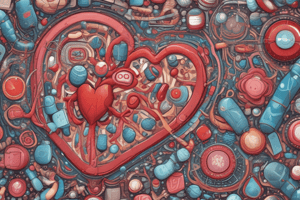Podcast
Questions and Answers
What is a common side effect of 1st generation non-selective beta blockers?
What is a common side effect of 1st generation non-selective beta blockers?
- Hypotension (correct)
- Shortness of breath
- Hyperkalemia
- Hypertension
Which condition should beta blockers be contraindicated in?
Which condition should beta blockers be contraindicated in?
- Migraine
- Hypertension
- Diabetes (correct)
- Glaucoma
What type of beta blocker is nebivolol classified as?
What type of beta blocker is nebivolol classified as?
- 1st generation non-selective
- 3rd generation non-selective
- 2nd generation cardioselective
- 3rd generation selective (correct)
What is the primary action of ACE inhibitors?
What is the primary action of ACE inhibitors?
Which side effect is associated with ARBS?
Which side effect is associated with ARBS?
What is a potential contraindication for the use of loop diuretics?
What is a potential contraindication for the use of loop diuretics?
Which of the following medications is considered a K+ sparing diuretic?
Which of the following medications is considered a K+ sparing diuretic?
What is a common indication for the use of thiazide diuretics?
What is a common indication for the use of thiazide diuretics?
What is a significant side effect of non-dihydropyridine calcium channel blockers?
What is a significant side effect of non-dihydropyridine calcium channel blockers?
Which enzyme do carbonic anhydrase inhibitors target?
Which enzyme do carbonic anhydrase inhibitors target?
What condition could lead to the use of carvedilol?
What condition could lead to the use of carvedilol?
Which statement about the side effects of diuretics is true?
Which statement about the side effects of diuretics is true?
Which indication is specific to beta blocker use?
Which indication is specific to beta blocker use?
What is the role of dihydropyridines in hypertension management?
What is the role of dihydropyridines in hypertension management?
Flashcards
What are beta blockers?
What are beta blockers?
Beta blockers, also known as beta-adrenergic blocking agents, are medications that block the effects of adrenaline (epinephrine) and noradrenaline (norepinephrine) on the heart and blood vessels.
What are first-generation non-selective beta blockers?
What are first-generation non-selective beta blockers?
First-generation non-selective beta blockers block both beta-1 and beta-2 receptors. Beta-1 receptors are found in the heart, and beta-2 receptors are found in the lungs and other tissues.
How do first-generation non-selective beta blockers affect the heart?
How do first-generation non-selective beta blockers affect the heart?
First-generation non-selective beta blockers block beta-1 receptors in the heart, leading to decreased heart rate, decreased force of contraction, and slowed conduction through the AV node.
What are the side effects of first-generation non-selective beta blockers in the airways?
What are the side effects of first-generation non-selective beta blockers in the airways?
Signup and view all the flashcards
What are second-generation cardioselective beta blockers?
What are second-generation cardioselective beta blockers?
Signup and view all the flashcards
How do third-generation non-selective beta blockers affect the body?
How do third-generation non-selective beta blockers affect the body?
Signup and view all the flashcards
What are RAAS inhibitors?
What are RAAS inhibitors?
Signup and view all the flashcards
How do ACE inhibitors work?
How do ACE inhibitors work?
Signup and view all the flashcards
How do ARBs work?
How do ARBs work?
Signup and view all the flashcards
How do loop diuretics work?
How do loop diuretics work?
Signup and view all the flashcards
How do thiazide diuretics work?
How do thiazide diuretics work?
Signup and view all the flashcards
How do carbonic anhydrase inhibitors work?
How do carbonic anhydrase inhibitors work?
Signup and view all the flashcards
How do potassium-sparing diuretics work?
How do potassium-sparing diuretics work?
Signup and view all the flashcards
How do calcium channel blockers work?
How do calcium channel blockers work?
Signup and view all the flashcards
How do dihydropyridines work?
How do dihydropyridines work?
Signup and view all the flashcards
How do non-dihydropyridines work?
How do non-dihydropyridines work?
Signup and view all the flashcards
Study Notes
Anti-hypertensive Medications
-
Beta-Blockers: Reduce heart rate, AV conduction, and contractility by blocking beta-1 receptors. Beta-2 receptor blockade can cause bronchoconstriction.
- First Generation (Non-selective): Propranolol, timolol, nadolol.
-
Side Effects: Hypotension, arrhythmias, sexual dysfunction, GI disturbances, bronchospasms, bradycardia, masking hypoglycemia.
-
Indications: Arrhythmias, hypertension, glaucoma (timolol), migraine prophylaxis (propranolol).
-
Contraindications: Asthma, COPD, AV block, cardiogenic shock, diabetes, hepatic/renal impairment, Raynaud's phenomenon, hypotension.
- Second Generation (Cardio-selective): Atenolol, bisoprolol, metoprolol.
-
Side Effects: Depression, erectile dysfunction, arrhythmias, fatigue, dizziness, masking hypoglycemia, bradycardia.
-
Indications: Hypertension, angina, arrhythmias, heart failure, glaucoma.
-
Contraindications: Asthma, COPD, Raynaud's phenomenon, AV block, cardiogenic shock, hepatic/renal impairment, diabetes.
- Third Generation (Non-selective): Carvedilol, labetalol.
-
Action: Blocks beta-1 & beta-2 receptors, and alpha-1 receptors causing vasodilation and decreased blood pressure.
-
Side Effects: Bradycardia, bronchoconstriction, hypotension, fatigue, dizziness, diarrhea.
-
Indications: Hypertension, pregnancy, heart failure (carvedilol).
-
Contraindications: Asthma, COPD, AV block, cardiogenic shock, Raynaud's phenomenon, hepatic/renal impairment, diabetes, bradycardia, hypotension.
- Third Generation (Selective): Nebivolol, betaxolol.
-
Action: Blocks beta-1 receptors. Nebivolol increases nitric oxide (vasodilator). Betaxolol blocks calcium channels.
-
Side Effects: Hypotension, fatigue, sexual dysfunction, dizziness.
-
Indications: Hypertension, angina, heart failure (nebivolol).
-
Contraindications: Pregnancy, diabetes, AV block, cardiogenic shock, asthma, COPD, hepatic/renal impairment, Raynaud's phenomenon.
RAAS Inhibitors
-
ACE Inhibitors: (Prils) Inhibit the ACE enzyme, preventing angiotensin II formation, causing vasodilation and reduced blood pressure. Bradykinin is not inhibited, leading to more vasodilation.
-
Side Effects: Dry cough, hyperkalemia, angioedema.
-
Indications: Hypertension, heart failure.
-
Contraindications: Pregnancy, hyperkalemia.
-
ARBs: (Sartans) Inhibit AT1 receptors, reducing angiotensin II effects and aldosterone release leading to decreased sodium reabsorption and potassium excretion.
-
Side Effects: Hyperkalemia, dizziness, leg swelling, headaches.
-
Indications: Hypertension, congestive heart failure, diabetic nephropathy.
-
Contraindications: Pregnancy, hyperkalemia.
Diuretics
-
Loop Diuretics: (Furosemide, torsemide) Inhibit NKCC in the ascending limb of the loop of Henle, reducing sodium, potassium, and chloride reabsorption, promoting water loss.
-
Side Effects: Hypovolemia, hypocalcemia, hypokalemia, hyperuricemia.
-
Indications: Hypertension, congestive heart failure, liver cirrhosis, kidney disease.
-
Contraindications: Pregnancy, anuria, hypokalemia.
-
Thiazides: (Hydrochlorothiazide, chlorothiazide) Inhibit NaCl reabsorption in the distal convoluted tubule.
-
Side Effects: Hypovolemia, hypercalcemia, hyperlipidemia, erectile dysfunction, photosensitivity.
-
Indications: Hypertension, congestive heart failure, diabetes insipidus.
-
Contraindications: Pregnancy, gout, anuria.
-
Carbonic Anhydrase Inhibitors: (Acetazolamide) Inhibit carbonic anhydrase enzyme, reducing sodium reabsorption.
-
Side Effects: Metabolic acidosis, hypokalemia.
-
Indications: Hypertension, glaucoma, congestive heart failure, metabolic alkalosis.
-
Contraindications: Pregnancy, hypokalemia, metabolic acidosis.
-
Potassium-Sparing Diuretics: (Spironolactone, amiloride) Act in the collecting duct to reduce sodium reabsorption and potassium excretion.
-
Side Effects: Hypotension, gastrointestinal upset.
-
Indications: Congestive heart failure, liver disease, preventing hypokalemia.
-
Contraindications: Anuria, renal insufficiency, pregnancy, hypotension.
Calcium Channel Blockers
-
Dihydropyridines: (Amlodipine, felodipine) Block calcium channels in vascular smooth muscle, causing vasodilation.
-
Side Effects: Peripheral edema, swollen gums, headaches, dizziness, flushing.
-
Indications: Hypertension, angina pectoris.
-
Contraindications: Heart failure, hypotension.
-
Non-dihydropyridines: (Verapamil, diltiazem) Block calcium channels in the heart (SA and AV nodes), slowing AV conduction, decreasing force, and heart rate.
-
Side Effects: Bradycardia, AV block, arrhythmia (verapamil—constipation).
-
Indications: Hypertension, arrhythmias, stable angina.
-
Contraindications: Heart failure, hypotension, beta blockers.
Studying That Suits You
Use AI to generate personalized quizzes and flashcards to suit your learning preferences.




